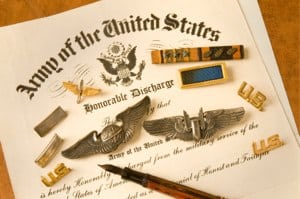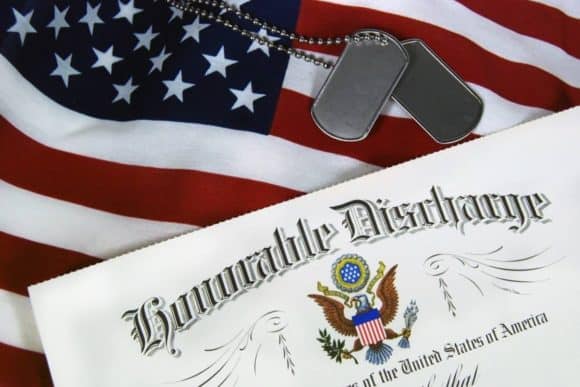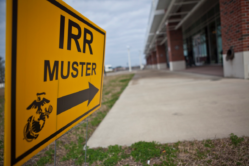Podcast: Play in new window | Download
Subscribe: Apple Podcasts | Google Podcasts | RSS
Your military discharge characterization (or rating) is important for many reasons. A high rating can open the door to various benefits, including the ability to qualify for government employment, reenlistment eligibility, and certain VA benefits. On the other hand, not having a high enough rating can impact your eligibility for certain benefits.
Today’s article and podcast discuss the importance of your discharge characterization, how it can impact your future, and how you can appeal your discharge characterization and possibly receive an upgrade. This is especially important for veterans who may have experienced Post-Traumatic Stress Disorder (PTSD) or Traumatic Brain Injury (TBI) symptoms that impacted their discharge characterization, as new guidance from the DoD makes it easier for veterans to appeal a discharge where evidence of PTSD or TBI impacted the characterization.
Meet Our Expert – Ferah Ozbek

Our expert is Ferah Ozbek, a retired USAF Judge Advocate. Ferah has over 25 years of experience and insight as a former military attorney (retired colonel). This experience helps her develop the best strategies to represent her clients.
As a former Senior Legal Advisor and voting member to the Secretary of the Personnel Council’s Discharge Review Board, she reviewed hundreds of applications by service members and knows what the military looks at when deciding whether your discharge rating should be upgraded.
You can learn more about Ferah Ozbek and her work at her LinkedIn profile or her website, FerahOzbek.com. Ferah also runs the Military Law Matters Podcast, which covers legal topics pertaining to military members and veterans.
How Your Discharge Characterization Impacts Your Future
An honorable discharge can open many doors, including preference points for military service when applying for a federal position, access to certain military and veterans benefits, and more. Conversely, even a general discharge under honorable conditions may not be high enough to earn certain benefits.
How does your discharge negatively affect you?
- Unless you have an honorable discharge, you are ineligible for the Post 9-11 GI Bill education benefit – worth tens of thousands of dollars.
- Unless you have a discharge under honorable conditions, you are ineligible for VA compensation and a VA pension.
- Unless you have a discharge under honorable conditions, you may be disqualified from receiving VA medical care.
Mistakes Can Happen, and You Can Appeal Your Discharge
The military makes mistakes, and these mistakes have a huge impact on you and your family. The Department of Defense wants all veterans to know they can have their discharge and military records reviewed to correct any injustice.
Why? Because the Department of Defense wants to ensure that “all Veterans who have sacrificed so much in service to our great Nation receive all of the benefits” they deserve.
The DoD is Paying Special Attention to Discharges where PTSD or TBI Are Involved
Even if you already submitted an application to the Discharge Review Board (DRB) and your discharge was not upgraded, the services will review your case again, applying new guidance the Department of Defense issued in 2014 as it relates to Post-Traumatic Stress Disorder (PTSD).
The Department of Defense has stated that “liberal consideration will be given in petitions to changes in characterization of service”…when there is evidence of Post-Traumatic Stress Disorder or related conditions such as Traumatic Brain Injury (TBI).
Your Right to Appeal Your Discharge Characterization
If you received a discharge characterization that is other than “Honorable,” you may request a military discharge upgrade. To do so, you must submit a DD Form 293 to the appropriate Discharge Review Board (DRB) and convince them that your discharge rating should be upgraded. But there is a catch – the DRB won’t automatically upgrade just any discharge request simply because you ask. You must convince the Discharge Review Board that your discharge was improper or inequitable. Let’s look at what this means and how you can apply to get your discharge upgraded.
Improper or Inequitable Discharge

An improper military discharge is one that was made in error or one that violates laws or military regulations. In some cases, this could be an administrative snafu or a misclassification. An inequitable military discharge is inconsistent with military traditions or policies.
Many circumstances could qualify for these two classifications, and it is recommended that you seek legal counsel to help you determine the best way to challenge your discharge rating.
Examples of Discharge Characterization Upgrades
Here are some real stories of military members whose discharges were upgraded through the Review Boards Process (Source: DoD Boards of Review Reading Rooms).
- A soldier was discharged with an under other-than-honorable conditions discharge (UOTHC) for drug abuse. He was found guilty of using illegal drugs, being AWOL, and violating a lawful general regulation. But there was more to the story. The soldier was deployed to Iraq; he was involved in combat; an IED hit him. And, while the soldier was carefree and upbeat prior to his enlistment, after returning from Iraq, his whole demeanor changed. He became wild and unpredictable. After the soldier’s discharge, the VA diagnosed him with PTSD and TBI. Based upon his diagnosis, the DRB found a nexus between the soldier’s diagnosis and his misconduct. This soldier served his country twice in combat, and something happened to him. The DRB upgraded his discharge to an honorable discharge and changed the reason for discharge from misconduct to Secretarial Authority.
- A military member was discharged after he reported misconduct committed by a senior soldier. He was a victim of reprisal. The DRB upgraded the member’s UOTHC discharge as they concluded his command acted in an arbitrary and capricious fashion.
- An Airman’s command waited eight months to discharge her after her last incident of misconduct. The DRB upgraded this veteran’s discharge as they found the discharge to be arbitrary and capricious–waiting eight months to initiate discharge was unjust.
- A soldier’s Post-Service Conduct was so outstanding that the DRB upgraded his discharge to an honorable one even though he had a conviction.
- A military member was discharged for his sexual orientation. The DRB changed his reason for separation to Secretarial Authority.
Military Discharge Review Board (DRB)
Each service has a DRB that allows former military members to request a review that could change their characterization of service, the reason for discharge, and their re-enlistment code based upon mistakes made by the Service.
- Note: the Navy runs the Discharge Review Board for both the Navy and the US Marine Corps.
The DRB consists of a five-member board consisting of a legal advisor, medical advisor, personnel advisor, senior NCO, and a senior officer. They can review almost any discharge, except for a discharge or dismissal by sentence of a general court-martial. You can read more about the law governing Discharge Review Boards here: Title 10, United States Code, Section 1553.
When you fill out your DD Form 293 (discharge upgrade request form), you can present your case at the DRB in Washington D.C, in front of a traveling DRB or have a records review board without presenting your case in person. If you have the means, it is almost always recommended that you have legal representation present your case in person. Regardless of which method you choose, it’s important to understand there are no guarantees, and discharge upgrade request approvals are not common.
ADVERTISEMENT
There is No Such Thing as an Automatic Upgrade to Honorable
Many people mistakenly believe they can get their discharge automatically upgraded to an Honorable Discharge after 6 months (or some other time period). Unfortunately, this is not the case. In the mid-late 1970s, the Army discharged many soldiers when they used a urinalysis to screen for drug use.
The courts later ruled that it was OK to discharge those soldiers on those grounds, but there was an administration snafu regarding the discharge classification. See the United States District Court for the District of Columbia in ”Giles v. Secretary of the Army” (Civil Action No. 77-0904) for more information. Many soldiers who were discharged under those rules prior to January 1, 1975, were able to get a military discharge upgrade on those grounds.
How to Request a Military Discharge Upgrade
To request a discharge upgrade, you must download DD Form 293 – Application for the Review of Discharge or Dismissal from the Armed Forces of the United States.
Ensure you have the most recent version of the form and follow the steps to complete the form as completely and accurately as possible. Instructions can be found on pages 3 and 4 of the form. Be sure to sign and date the form before submitting it.
Including supporting documentation, such as your DD 214, military records, and statements from former supervisors, first sergeants, commanders, and other veterans you served with, is a good idea.
Mail the completed DD Form 293 to the appropriate address listed on the DD Form 293 for each respective service.
What You Should Know About Requesting a Military Discharge Upgrade
Your personal statement and statements from those who served with you are invaluable. Do your best to obtain statements from your former supervisors, first sergeant, commander, or others in your chain of command regarding your duty performance and facts and circumstances that may support your case to upgrade your discharge characterization. In most situations, the Boards focus on your conduct during your period of military service. However, in rare circumstances, Boards may upgrade a discharge based on post-service conduct.
Discharge upgrades are possible. Legal counsel who is familiar with the discharge process can provide you valuable advice on the strategy to upgrade your discharge and whether your case may warrant an upgrade or change in the reason for discharge. If you want to consult with counsel, it is always best to consult with counsel with experience in these types of cases, as this is a very specialized area of military law.
You may also seek counsel or advice from a veterans organization for more information. Try your local VFW, American Legion, or similar organization as a starting point, and go from there.
Expect the application, review process, and decision to take several months from start to finish depending upon the number of cases pending with your service. Applicants who opt to present their case in person generally have a more favorable chance of an upgrade than those who do not appear in person, assuming there is a basis for an upgrade.
Upgrade Requests Must be Made Within 15 Years – But There is Hope
Veterans must request an upgrade within 15 years of separating from active duty. Otherwise, they must request a change to their military records by submitting an application to their service’s Board for Correction of Military Records using a DD Form 149, which is an entirely different process.
In this application, you would submit evidence to support that your discharge characterization or reason for discharge was in error or that there was an injustice based on the facts and circumstances of your case.
As discussed in the podcast, discharges due to PTSD and TBI-related reasons may have more leniency for the Discharge Review Boards and for the Board of Correction for Military Records. Again, this isn’t an automatic upgrade, but it can improve your odds of having your discharge upgraded.




Comments:
About the comments on this site:
These responses are not provided or commissioned by the bank advertiser. Responses have not been reviewed, approved or otherwise endorsed by the bank advertiser. It is not the bank advertiser’s responsibility to ensure all posts and/or questions are answered.
Stephen Hanks says
I was discharged in January of 1975. I was unjustly discharged and I went to the Navy Discharge Review Board and was Denied an upgrade.
I was 17 years old and an unruly youth, back in 1973 the military was accepting troubled youths in hope of some sort of rehabilitation, I joined on
my 17th birthday. My mother took me too the recruiters office. Anyway I continued my wayward ways.
I was 18 years old and partying off base when entering base in another marines car the Military Police got our last names mixed up and
the charges came to my squadron and I asked for an Administrative discharge and received it. If it weren’t for the military police mixing up
our last names I would have finished my recruitment. The fact remains that the military police had never checked the registration of the
vehicle we were in. I feel I was a victim of injustice by the Military Police in the Marine Corps. I have posted my situation to an online post
and got a response from a 30 year veteran of the VA and he has told me to contact you in hope for assistance.
I’m having some problems with the events that you are describing. First let me describe my background. I started working at VA in 1976
and over the course of my 30 year career there I probably wrote at least 200 Character of Discharge decisions for VA. With some limited
and actually quite rare situations VA makes its own determinations as to whether a discharge is qualifying for VA benefits.
You said that you requested a discharge and your request was granted with a Undesirable Discharge. The problem I have is that the offense
you described would typically result in a General Discharge Under Other Than Honorable Conditions rather than an Undesirable Discharge
which was generally reserved for either a more serious offense or a repeated pattern of offenses. I’m not saying that you couldn’t get an
Undesirable Discharge for the offense you describe, but rather that it wasn’t the norm.
As for the MP getting the last names mixed up, that also seems odd since the owner of the car is the one responsible for its contents and any
mix up could easily be resolved by the vehicle registration. That wouldn’t necessarily mean that a passenger couldn’t also be held liable so
I’m not sure how the MP mixing up names would be a factor.
Then there is the issue of the VA decision. It was rare for VA to hold that a bad discharge issued for a relatively minor one time offense with
otherwise good service to be under dishonorable conditions.
In the late 70s the military issued essentially blanket upgrades of most of the administrative discharges issued at the time you received your
discharge. As a result of this across the board upgrades of these discharges VA had to go back and write a second decision on these discharges
resulting in favorable findings for many. Did you receive on of these upgrades by DoD and if so did you get a second decision by VA?
When VA initially denied your request for benefits what did they give as to the specific reason that your discharge was held to be under
dishonorable conditions?
Can you please give my situation a review and help please ?
Jules Miller says
How can I research prior decisions of the Discharge Review Boards, since decision documents in the Electronic Reading Room for Discharge Review Boards “have temporarily been removed to conduct a quality assurance review”?
Efrain Ramos says
Does it work for national guards men also my ngb 22. Form says under honorable conditions can i upgrade this.
Arthir Johnson says
I was discharged in 1987. Under honorable
However, it states drug n alcohol rehab failure. I never was sent. 1) after I attempted suicide. 2) was not paid for 8 months while over seas. 3) prior to overseas had both ankles burnt 1,2 n, 3rd degree. All I want is my dd214 not to say drug n alcohol failure.
Can u help? Yes, I do think I had shell shook but am not worried about that.
Can you help?
Ryan Guina says
Hello Arthir, The basic overview of how to request a military discharge change is outlined in the article.
“Veterans must request an upgrade within 15 years of separating from active duty. Otherwise, they must request a change to their military records by submitting an application to their service’s Board for Correction of Military Records using a DD Form 149.”
This isn’t something I have direct experience with. I recommend contacting someone that specializes in this, or contacting a Veterans Service Organization such as the DAV, AMVETS, VFW, etc. They may be able to assist you.
I wish you the best, and thank you for your service!
Rod says
I was discharged in 1987 with a “ Other Than Honorable Discharge”. I supposedly stole $12.00. During my time in I sustained numerous blows to the head and torn knee ligaments requiring surgery while stationed at Ft. Devons.
I’m have terrible headaches and knee pain. Is it possible to get medical care and benefits?
Michael Tulipat says
First I want to thank Ferah Ozbek and Ryan Guina for your services, continued services to our country and veterans. I have been going through this process since 2015. I have had 1 unsuccessful attempt. My service record went into a 15 year over time frame and took it with BCNR. They gave me a partial upgrade because at the time I felt it was just. Changing the narrative reason to convince to the secretary from personality disorder, keeping both NJPs, and leaving RE-3P. That was last year and I recently discovered an article. That two months after I was discharged operation xterminator was disclosed. 84 services members arrested and discharged. Some of them I know where involved in my unjust discharged plus I have sufficient evidence I shouldn’t have been discharged in the first place. The time line of events didn’t make since. I never had issues going through MCRD, SOI west, and 17 years after discharge I have no criminal history record, I volunteer for WCSO, I am a CHL holder, Married, Associates Degree with a 3.0 GPA. I successfully passed the TSO hiring process. I should be able to go back and finish my duty. Thank you
WM hall says
I was discharged under an undesirable discharge
I enlisted and 6 weeks after my grandmother passed away
My Sargent said I could attend the funeral and the next day he called my dad said I was AWOL and not to come back
At time of discharge I was told since I was there less than 180 days my discharge would up grade this in 73 should I even bother
Leroy says
Greetings,
I was discharged in 1997 from Basic after injuring my feet. I tried to stay in and followed all medical directives, even transferred to FTU for a bit to heal. I was told by the doctor at my last appointment that they had no choice but to discharge me. It was stated that I would be discharged under a Med Board discharge. I believe the specific term was ”Med Board 500,” but I am not 100% certain of the number.
Anyway, I did not notice until after I was home for about a year that my DD214 listed me as receiving an ELS and that I had distinctions (hand grenade, bayonet) left off of my official paperwork. I called a number that was listed for such Army concerns and they stated that there was nothing I could do.
Being young and gullible, I put it out of my mind and continued with life as best I could. However, now that I am older, I am wondering if it is too late to set things right. I have always felt a pang of regret for not ”being able” to remain in as it was a firm goal of mine. Do I have options in 2019?
Rusty says
You don’t have the case number for the airman? I’m currently in midst of appealing my case where there was 14 mths between the misconduct and the sep board, With another 2 months before discharging me the day before my eas
Jessica says
I was discharged with a medical separation. I am currently fighting to get upgraded to retirement. If I do win this do you know if it will be retroactive? Will I receive back pay from Army from time of separation?
Ryan Guina says
Hello Jessica, This is outside my area of expertise. Military medical retirements can be complicated and each situation is unique. That said, if the Army backdates your discharge to a medical retirement, then yes, I believe you would receive retroactive retirement pay.
You should also file for a VA disability claim. Your disability award would be retroactive to the date you separated from the military, provided you file within a year of separating from the military. If you file more than a year after separation, back pay will most likely be to the date you filed your claim.
I would work closely with your lawyer or the individual helping you with your claim for more specific information. If you don’t have someone helping you, I would look into it, as the upgrade process can be complicated.
I wish you the best, and thank you for your service!
Mark Hanuschik says
I was discharged in 1981 and was told if I had taken 100% medical discharge I could not work. I had TBI several wounds and a catheter through my belly button for blood drainage. The USAF and the VA seems to have lost most of my records until a Police report was found. Now several bases have been contacted and though my files could not have been burned in the 73 fire I was told they were plus shredded, are still in boxes in Philadelphia VA hospital but they have to check. There are several hospitals and non have complete records or any. My VSO got 70% for what was found. I am told wounds on my body are not from the military and are. It seems my top secret clearance may have something to do with my records as I have a non ending non disclosure. I do not think the redacted parts should be hidden. The letters of commendation are missing and I asked my VSO why can my sergeant be contacted he said that would be impossible, doubtful. I worked with not for OSI and with my recollection and the files we did get it would complete my benefits request. I did take a Honorable discharge for my parents needing me at home. I went to Philadelphia as I was having problems and the 18” scar on my head was to have plastic surgery and the doctor said to come back in six months and I called her and she said I no longer was covered under VA Benefits. My TBI worsened and another vet said they lied to you that I’m still eligible. I did get 70% but should get my original entitlement.
I do not understand how partial records are missing and the wounds are on my body. Is there more I can do. I was told to get an attorney. My head doesn’t work correctly anymore I had to have my spine fused and under non disclosure I cannot tell my regular PCP what happened. He has written a letter in my defense but how far will that go?
M_
Ready Steady says
Ryan,
I seperated from Army Reserves back in 2013. Discharge was General Under Honorable. Reason, tested positive on UA. I have received my Seperation Papers, but the Army Reserves does give out DD 214 or an R code. I would really like to reenlist to change the the mistakes that I made in the past when I was younger. I have contacted recruiters, VA, and Army Human Resource center and they are having a hard time finding answere… they have never ran in to that problem it’s what I’m assuming. On a side note, they did give me two DD 214 one from Basic and one from when I came back from deployment. The Deployment DD 214 is Honorable. What should I do…?
Ryan Guina says
Hello Ready Steady, Thank you for contacting me. I don’t have an answer here. I would try to get an upgraded discharge rating if possible. If that doesn’t work I would just try to work with your recruiter and see what happens.
Richard Craig says
I was discharged in 1983 through the trainee discharge process. I’m not sure what it is called now. I was told that it would be honorable after 6 months. A few years later I was diagnosed with acute bipolar disorder which began manifestation while in the Army. Do I have any recourse?
Ryan Guina says
Hello Richard, Thank you for contacting me. Your situation is unique and not something I have experience with. I recommend speaking with a veterans benefits counselor at a Veterans Service Organization, such as the DAV, AMVETS, etc.
G. Saldana says
I was discharged in 1983 for Zero Tolerance drug abuse. What can I do to upgrade much status?
Jesse J Watters says
Do you have an article for a change to military records? I should have received a medical but I received Gen under Hon. My medical benefits are now being cut.
Ryan Guina says
Hi Jesse, You should contact your branch of service personnel section to inquire about the process. They should be able to point you in the right direction. Make sure you have the required documentation, including your medical records, copies of letters, or any other necessary documents. If it has been longer than 15 years, you should contact the Review Board for your branch of service (addresses and contact information inside this article).
This is also a situation where it is probably a good idea to enlist some assistance. There are many Veterans Service Organizations that have free assistance from veterans benefits counselors, including the DAV, VFW, etc. I hope this gets you started on the right path.
joel says
Im going to the Army Review Board tomorrow morning. I would like to get an idea of what to expect tomorrow morning.
Ryan Guina says
Joel, I don’t have personal experience here. Our article is designed to let people know that an upgrade is possible under certain circumstances, and to provide general tips about the process. My recommendation is to look for a forums that has specific information on this topic. Beyond that, my recommendation is to be truthful, and humble and respectful. You need to let the board know that you believe your discharge should be upgraded for certain reasons, and that you have done everything in your power to correct whatever issues may have caused the discharge rating you received. It will not help your cause to be disrespectful or act as though the Army owes you anything. That will be a quick way to getting your upgrade request denied. Best of luck, and thanks for your service!
John Thomas says
If you have a lawyer or know of any knowledgeable military review lawyer can you please refer, so so appreciate it.
Ryan Guina says
Hello John, I don’t have any professional references for this. I recommend contacting a local Veterans Service Organization for a referral (DAV, VFW, AMVETS, etc.). They may have someone they can refer you to. I wish you the best, and thank you for your service!
Skye says
All this guy (Ryan Guina) did was copy and paste information from one site to his. He isn’t qualified to answer any of the above questions and have no legal education or experience to address the issues of a discharge. A discharge upgrade isn’t as difficult as he makes it seem. It’s as simple as telling your story, backed up with supporting documents, about how or why your punishment was not in line with military traditions or against some policy. You do not need to pay an attorney thousands of dollars to do this for you. I did my own. I now have a law degree and 17 years of military experience to support any contention I may have about how this process works.
Ryan Guina says
Hello Skye, I’m glad to hear you were able to get your discharge upgraded. Thanks for your service.
Richard Tariuwa says
I got discharged for misconduct( fighting) in 2001 from USAF with 2b, re-listment code meaning i could no longer re-list to any other branch of service. My discharge was’Under honorable conditions’. i am no longer in contact with anybody that i served with. Quite honestly i do not have any other compelling new evidence to present to the board. I tried seeking legal help, most of them told me it was waste of my time, and that my request will be tossed out.The 15 year mark is slowly closing in, i’m stuck here don’t know what to do. Do you have advice on what my next course of actions should be.
Franklin says
I was getting paid $46 , after talk to dfast multiple runaround I talk to counselor he send me to my Chief and after multiple runaround from dfast he tell me the I should talk to His superiors to see how the can help me I do that and she sed the it wasn’t her problem and there I have to suckerup like a good soldier and I tell her I can do that but my two kids and wife was getting kick out of are Apt because with $46 I can’t paid the rent..so my wife send me a 24hrs eviction noticed from the Apt and I showed to my Chief and he tell me ” if I was you I would go and take care that ” due the no help here for you. So I went home and they give me a discharge of Other than. Now my question is can I upgrade that due the helpless part from the Navy and for ruins my future in the service ? I do my part of my contract they don’t
Edward Brady says
My son left Virginia Tech (NROTC scholarship) in 2008, due to previously diagnosed anxiety and depression that resurfaced, and was told that there would be no recoupment of funds.
He is being invoiced for over $20,000 and being assessed monthly interest and late fees of $200.
I am at a loss for how to help him, as this alleged debt continues to spiral out of control. The Navy knew he had issues before he was enrolled, and took a chance on him, knowing that his illness could resurface. We also followed the Cadet to Civilian Out-Processing checklist where they told us that this was a medical discharge.
Where do I go for help? Is there an appeals process that I can follow?
If he can not have this recoupment waived, maybe they can (at least) stop the penalty and interest, so he can start making progress.
Pleas advise – where can we turn?
Ryan Guina says
I’m sorry about this situation, and I wish your son the best. To be honest, I don’t know how to go about resolving this situation. If he has it in writing that there would be no recoupment of funds, then he should be able to send a copy of that to help resolve the situation. If he was told this verbally, then I’m not sure what recourse he has.
I’m not well versed with the ins and outs of ROTC scholarships and I recommend he research his options by contacting the ROTC department or the college bursar’s office to find out the stipulations of these scholarships.
I wish you the best of luck.
James says
Hey Ryan,
Good stuff, I’m not military, but I wanted to point out that your articles on the Thrift Savings Plan can apply to DoD civilians as well – there are over 250,000 in the Department of the Army alone.
Best,
James
Ryan Guina says
Yes, I primarily focus on the military, but the TSP is a benefit that covers civil service as well. You can even transfer your TSP from one to the other service, or maintain two different TSP accounts, though the annual contribution limits apply across both of them. For example, someone who is in the civil service and the military Reserve Corps could have a TSP with both services, but would be limited to $17,500 in individual contributions in any given year (provided they are under age 50).
Someone who leave the military and then joins the civil service can then import their TSP from the military into their civil service TSP, or vice versa. However, it isn’t recommended that veterans transfer their TSP into the civil service TSP if they have tax free contributions from a combat zone, as the tax free designation on those contributions may not transfer with the funds.